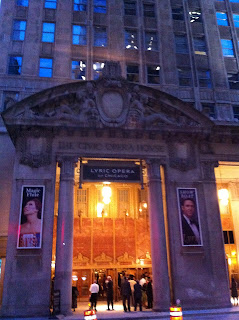 |
| Chicago's Civic Opera House |
The seminal work in American musical theater begins with loud, uncomfortable notes, filled with foreboding, as the curtain opens on black stevedores loading cotton while singing “Niggers all work on de Mississippi, Niggers all work while de white folks play ....”
Whoa!
Imagine sitting in the audience on opening night, December 27, 1927, expecting the usual light fare.
Mark Steyn writes in
Broadway Babies Say Goodnight: “From that first shocking word, confronting mid-town Manhattan with aspects of their society they preferred not to think about, Jerome Kern and Oscar Hammerstein II presented their audience with something new: drama in music, with neither element constrained by the other.
It is the ultimate opening number, because it is the opening number for all [in American musical theater] that follows.”
Show Boat was the first work to take serious themes and tightly integrate music and lyrics into the narrative, where they advance and expound on the story line, a serious story line – resulting in what Steyn calls “the most important work in American musical theater, [as] it sums up what’s gone before and points the way ahead.”
 |
| Show Boat Backdrop on the Stage of the Civic Opera House |
A couple of weeks ago at Chicago’s Lyric Opera I took in the season’s last staging of the work that became Hammerstein’s masterpiece – actually, the first of many for the greatest lyricist in musical theater and perhaps its greatest dramatist.
The production was well-done and spirited, although to bring the running time in at a brisk 3 1/3 hours it by necessity didn’t include every one of the many scenes and songs written by Kern and Hammerstein for the original and for various stage and film reprises (for that we have the excellent 1988 compilation by John McGlinn featuring Frederica von Stade, Jerry Hadley, Teresa Stratas, and Karla Burns, among others).
The singing and acting were very good and the music and lyrics, of course, incomparable, although the sparse set was disappointing for a Lyric production, granting the challenges of frequent scene changes and the invariable budget constraints.
The ensemble of supporting black singers and dancers was exceptional, and Ashley Brown as Magnolia and Angela Renee Simpson as Queenie particularly stood out.
The narrative spans several decades, and, against the backdrop themes of racial privilege and discrimination and the timelessness of the River, at the core is the sad story of a young woman who, despite being warned of the danger of falling in love with a “no-account river fella” because when “a girl like you starts to love a man, she don’t stop so easy,” nevertheless falls in love with a no-account river fella who later abandons her and their young daughter, proving that indeed, to her lifelong detriment, she couldn’t help lovin’ dat man.
R Balsamo













No comments:
Post a Comment